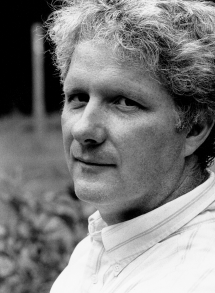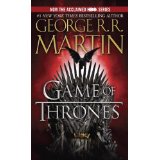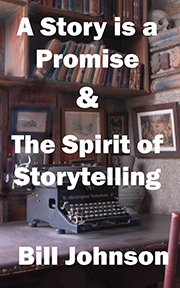| A Story is a Promise |
|
|
| Essays on the Craft of Writing |
| About the Author |
Small Slices

These reviews offer an overview of how the openings of these novels were written to engage an audience. They are not meant to convey a review of a full book, just a taste of one small slice of each book.
All reviews by Bill Johnson, copyright 2001-2023.
Notes on The Hunger Games
 The Hunger Games by Suzanne Collins offers an example of how to tell a story around a familiar if alien world, here the United
States that has divided into mini-states. This kind of story requires raising questions and introducing information about this new
world that draws an audience forward to want to know more.
The Hunger Games by Suzanne Collins offers an example of how to tell a story around a familiar if alien world, here the United
States that has divided into mini-states. This kind of story requires raising questions and introducing information about this new
world that draws an audience forward to want to know more.
In the beginning...
When I wake up, the other side of the bed is cold. My fingers stretch out, seeking Prim's warmth but finding only the rough canvas cover of the mattress. She must have had bad dreams and climbed in with our mother. Of course, she did. This is the day of the reaping.
The novel starts rooted in the POV of Katniss, a young girl. The opening conveys subtle information about the world, waking up cold, a mattress with a canvas cover, the question, what is the reaping? It also raises character questions, who is Prim? Why is she having bad dreams? What do her dreams have to do with the reaping?
Next...
I prop myself up on one elbow. There's enough light in the bedroom to see them. My little sister, Prim, curled up on her side, cocooned in my mother's body, their cheeks pressed together. In sleep, my mother looks younger, still worn but not so beaten-down. Prim's face is as fresh as a raindrop, as lovely as the primrose for which she was named. My mother was very beautiful once, too. Or so they tell me.
This conveys a stronger sense of place, but more questions. Why does the mother appear 'beaten-down'? What happened to the once beautiful mother? Who is this 'they' who commented on the mother's former beauty?
Continuing...
Sitting at Prim's knees, guarding her, is the ugliest cat in the world. Mashed in nose, half of one ear missing, eyes the color of rotting squash.
This conveys a description of a cat, but also a subtext about this world, that pets fend for themselves in a harsh world. There's also the subtext here that the narrator does not like this cat.
Continuing...
Prim named him Buttercup, insisting that his muddy yellow coat matched the bright flower. He hates me. Or at least he distrusts me. Even though it was years ago, I think he still remembers how I tried to drown him in a bucket when Prim brought him home.
Again, another question: why did the narrator feel compelled to kill the cat? With the title, Hunger Games, the reason is implied; one more mouth to feed.
Scrawny kitten, belly swollen with worms, crawling with fleas. The last thing I needed was another mouth to feed.
That confirms the why the narrator wanted the kitten dead, but raises another question: why is she responsible for feeding her mother and sister?
But Prim begged so hard, cried even, I had to let him stay. It turned out okay. My mother got rid of the vermin and he's a born mouser. Even catches an occasional rat. Sometimes, when I clean a kill, I feed Buttercup the entrails. He has stopped hissing at me.
This conveys the narrator's desire to make her little sister happy. That a pet is fed entrails and not cat food again suggests something about this familiar yet alien world.
Entrails. No hissing. This is the closest we will ever come to love.
There's a subtext here that in this harsh world, accommodations are made, but only grudgingly.
This is the first page of the book. It continues with the narrator getting up and ready to go out hunting, and relates that she lives in District 12 that is crawling with coal miners. Again, questions are raised that will soon be answered, and the answers will raise new questions.
The author next relates that District 12 is surrounded by an electrified fence to protect the inhabitants from wild dogs and other wild animals. District 12 is sounding more like a gulag, which it comes out that it is for most of its inhabitants, but the narrator is willing to go beyond that fence.
Suzanne Collins demonstrates a deft touch in introducing this narrator in a harsh world, but also showing her initiative to not be fenced in. Novels that lack this clearly defined, carefully crafted character and plot and scene development from their opening lines risk being static and dramatically inert.
Writing the Fantasy Hook
Notes on Page 1 of George R. R. Martin's Game of Thrones

My goal here will be to break down the 13 pages of the prologue, one page at a time.
In the beginning...
Game of Thrones opens with a map of this world, which is a quick way to orient readers to a new and different world.
Then...
Prologue
And...
"We should start back," Gared urged as the woods began to grow dark around them. "The wildings are dead."
The unusual name, Gared, is a quick way to suggest this is not contemporary world. The image of the woods growing dark also works as a metaphor to suggest darkness is coming upon this world. Details of a time and place ring true when they convey a subtext.
The line 'The wildings are dead' convey both mystery and questions. What are wildings? How did they die? Why does Gared feel this urgency to turn back?
"Do the dead frighten you?" Ser Waymar Royce asked with just the hint of a smile.
The mocking smile here suggests that Royce is in command of Gared, and also that Royce is arrogant.
Gared did not rise to the bait. He was an old man, past fifty, and he had seen lordlings come and go. “Dead is dead,” he said. “We have no business with the dead.”
That a man is old at fifty suggests the violence of this world. This passage also conveys something about the relationship of Gared to Royce (soldier loyal to a royal lineage), and that Gared is a no nonsense man. Martin has moved from a mysterious opening to specific details about the characters that provide one answer, what is Gared to Royce, but also raises more questions, what is this royal family Gared has been in service to? Are they part of this Game of Thrones?
This question, answer, question process demonstrates Martin's ability to both raise questions to draw readers in, and to provide answers that raise more questions that continue that process of engaging, holding, and rewarding the attention of an audience. At some workshops, I'll have new authors read from the first page of a manuscript one sentence at a time to show the lack of questions.
Continuing...
"Are they dead?" Royce asked softly. "What proof have we?"
This acts out that Royce is more thoughtful than Gared, and also suggests that Gared and Royce probably have differing goals.
Continuing...
"Will saw them," Gared said. "If he says they are dead, that's proof enough for me."
Will had known they would drag him into the quarrel sooner or later. He wished it had been later rather than sooner. “My mother told me that dead men sing no songs,” he put in.
This brings in the third character in the scene at a dramatic moment, and someplace he'd rather not be, in the middle of this argument.
"My wet nurse said the same thing, Will,” Royce replied. “Never believe anything you hear at a woman's tit. There are things to be learned even from the dead.” His voice echoed, too loud in the twilight forest.
A wet nurse is someone brought in to suckle the young of nobility, again conveying Royce's status. The line about learning from the dead also suggests the difference between Royce and Gared, a thoughtful young leader and a hardened warrior.
The note about his voice being too loud again conveys the menace of the situation. What or whom could be listening?
"We have a long ride before us," Gared pointed out. "Eight days, maybe nine. And night is falling."
What Gared conveys here is that he is willing to argue a point, even with a superior. This also raises the question, what is the destination of their journey?
Ser Waymar Royce glanced at the sky with disinterest. “It does that every day about this time. Are you unmanned by the dark, Gared?”
Royce openly taunts Gared now. The argument is escalating and raises a question: what will be the outcome of this taunt? How will Gared respond? Can he, if Royce is his lordling?
I'm ending the review here and will continue with the next page.
One feels reading this opening page that it is a step into and deeper into this world. Often when I read manuscripts and ask inexperienced writers why they are making banal choices, I often hear a word I dread. They are 'introducing' their characters. George R. R. Martin is doing something altogether different here. He has set his story into motion with these three men who are being swallowed by an ominous darkness.
One page, one step into this mysterious world.
Novels that lack that clearly defined, carefully crafted forward movement from their opening lines are often static and dramatically inert, no matter how nicely detailed the people and places. That's why most agents don't need to read more than a first paragraph to realize they aren't reading the next George R. R. Martin.
Notes on the Opening Page of The Casual Vacancy, a novel by J.K. Rowling
by Bill Johnson
To begin...
Sunday
Which asks the question, what is special about this Sunday?
Barry Fairbrother did not want to go out to dinner.
Which asks the question, why? One would also assume Barry is an important character in setting up the plot of the novel.
He had endured a thumping headache for most of the weekend and was struggling to make a deadline for the local newspaper.
This answers the question, why doesn't he want to go out to dinner? And also relates something about Barry's background, that he writes for a newspaper, and raises another question, why is he struggling to make this deadline? And, what is important about this article? Question, answer, question, a process often used to set a story in motion.
However, his wife had been a little stiff and uncommunicative over lunch, and Barry
deduced that his anniversary card had not mitigated the crime of shutting himself
away in the study all morning.
And this answers the question, why is he going out to dinner if he has a headache, and also offers more background detail, about Barry's marriage. And raises the question, will going out to dinner be enough to mollify his wife?
Struggling writers often start with the same details, but not the question, answer, question process that draws in readers and draws them forward. It's not about putting an actual question mark at the end of sentences, but naturally raising questions. When this process is done well, readers quickly learn to trust that if an author raises a question, it will be answered. In a badly written novel manuscript, one quickly despairs of getting anything other than an accumulation of descriptive details. It's the 'I'm watching this story as a mental movie and writing down the details' style of writing that locks in new writers to a faulty style of storytelling.
Continuing...
It did not help that he has been writing about Krystal, whom Mary disliked, although she pretended otherwise.
This is another answer to the question, why is Mary upset? It also raises the question, who is Krystal? And, why does Mary dislike her, and why does Mary pretend not to dislike her?
Continuing...
“Mary, I want to take you out to dinner,” he had lied, to break the frost. “Nineteen years,
kids!
Nineteen years, and your mother's never looked lovelier.”
This dialog conveys a dramatic truth about this marriage, that both the husband and wife casually lie to each other. Readers in the beginning of a novel need these kind of truths about a story's characters. Without that, one is simply being offered a collection of details, like someone cataloging the details of strangers in a photo without providing some clue to why anyone should care.
Mary had softened and smiled, so Barry had telephoned the golf club, because it was nearby and they were sure of getting a table. He tried to give his wife pleasure in little ways, because he had come to realize, after nearly two decades together, how often he disappointed her in the big things. It was never intentional. They simply had very different notions of what ought to take up most space in life.
In one paragraph, Rowling creates a damning portrait of a failed marriage, which raises the question, why are these two people are still together? And, if the mutual lying can continue to keep the marriage on life support.
Very often when I read novels by struggling writers I have to go on, and on, and on about conveying a main character's dramatic truth with their introduction. Often I find an utter lack of understanding of why this is important, or a weak attempt at it so the writer can continue on with their seeming passion, accumulating details that have no context, hence no dramatic purpose, eventually creating an impassible swamp of undifferentiated details.
This is why literary agents generally don't have to read more than a first paragraph to know if they are reading a well-told story. Agents are generally being kind when they tell people they read the first five pages.
Continuing...
Barry and Mary's four children were past the age of needing a babysitter. They were
watching television when he said good-bye to them for the last time, and only Declan,
the youngest, turned to look at him, and raised his hand in farewell.
There's a powerful question here, why is he saying goodbye for the last time? What's going to happen? This creates a compelling reason to keep reading.
Five paragraphs, the dramatic truths of these characters, and a powerful reason to keep reading. This is what successful novelists do on the first page of a novel.Top of page
